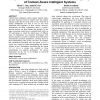6 search results - page 1 / 2 » Improving the performance of motor-impaired users with autom... |
CHI
2008
ACM
14 years 4 months ago
2008
ACM
We evaluate two systems for automatically generating personalized interfaces adapted to the individual motor capabilities of users with motor impairments. The first system, SUPPLE...
UIST
2010
ACM
13 years 2 months ago
2010
ACM
Computer users with motor impairments face major challenges with conventional mouse pointing. These challenges are mostly due to fine pointing corrections at the final stages of t...
AI
2010
Springer
13 years 4 months ago
2010
Springer
Today's computer-human interfaces are typically designed with the assumption that they are going to be used by an able-bodied person, who is using a typical set of input and ...
CHI
2009
ACM
14 years 5 months ago
2009
ACM
We conducted a 2.5 week longitudinal study with five motor impaired (MI) and four non-impaired (NMI) participants, in which they learned to use the Vocal Joystick, a voice-based u...
CHI
2009
ACM
14 years 5 months ago
2009
ACM
Context-aware intelligent systems employ implicit inputs, and make decisions based on complex rules and machine learning models that are rarely clear to users. Such lack of system...

